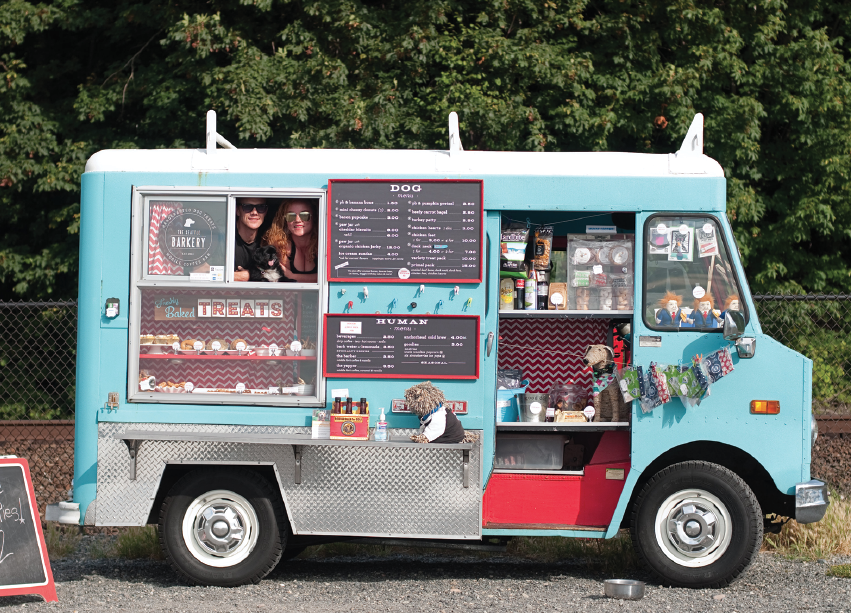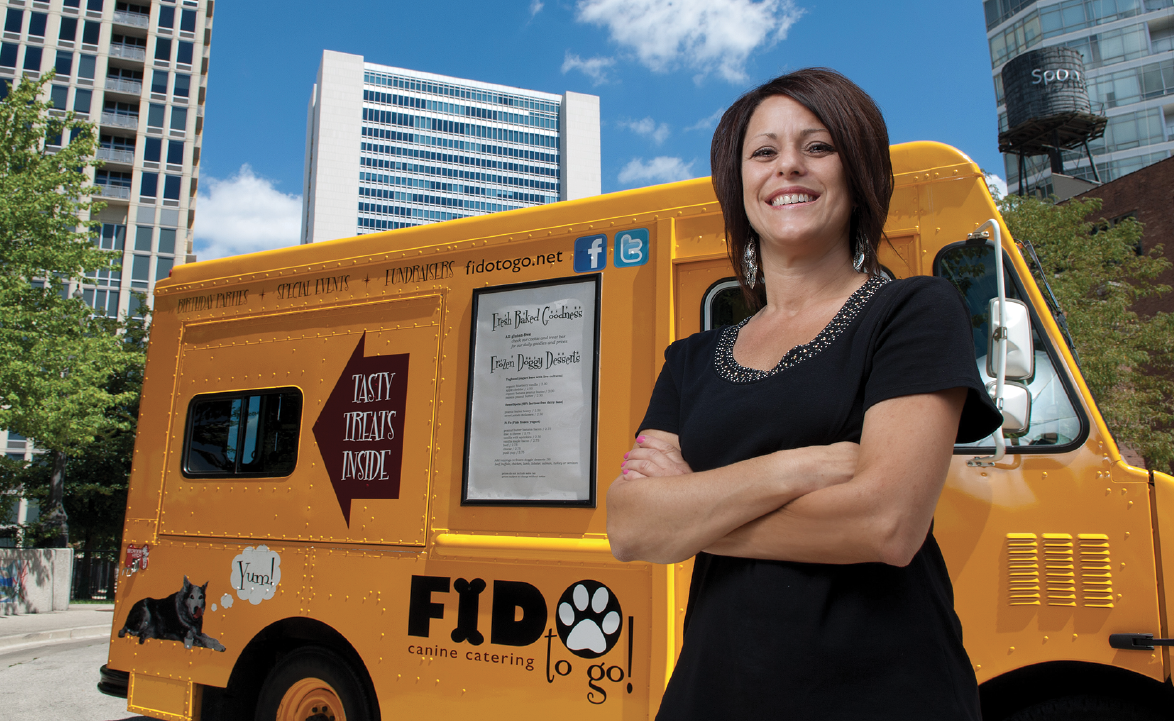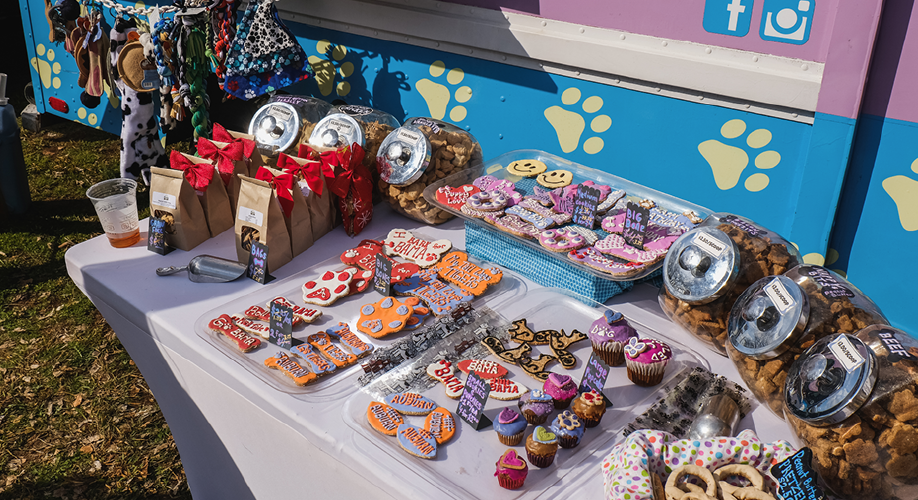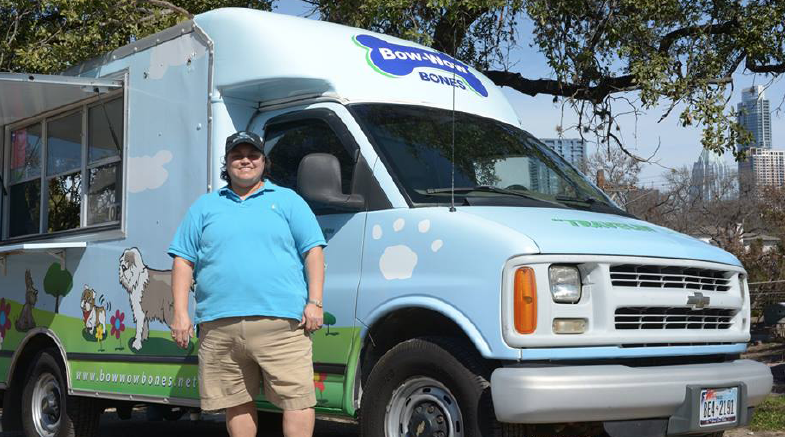YOU KNOW HOW IT IS. You’re hungry, searching for something to enjoy on-the-go. Something tasty. Trendy. And perhaps made of organic chicken necks or baked in the shape of bone.
Wait. Did we mention you’re a dog? Or that the dining destination you’re hunting for is a canine treat truck, one that caters just to your particular palate?
Just as human food trucks have grown more popular, popping across the country in large numbers to serve unique eats to a two-legged clientele, doggie treat trucks are also rolling into the mainstream.
In recent years, treat trucks have debuted in several parts of the country and around the world, with mobile-minded entrepreneurs traveling different paths to prosperity and managing — sometimes literally — a dizzying array of moving parts, including marketing, food preparation, vehicle maintenance and more.
Read on to discover what keeps these treat truck proprietors on the road to success.
You may even find yourself pondering new ways you can reach out to your own customer base.

1968 Chevrolet stepvan painted in Tiffany & Co. blue houses the Seattle Barkery.
Think Outside the Truck and Be Social Media-Savvy
The Seattle Barkery | Seattle, WA
In 2014, Dawn Ford and her husband Ben had accumulated enough savings to buy a bigger house. But deep down, Ford wondered if she could spend that money to pursue a dream she’d nurtured for some time: to start a doggie treat truck.
At the time, Ford — a former dog walker — was making her own treats and selling them at farmer’s markets. A truck was appealing because it was mobile and convenient, she explains. Her husband encouraged her idea, and in 2015, the Seattle Barkery was unleashed.
Ford and her truck soon found themselves attracting national media, including a spot on NBC Nightly News and a feature in USA Today.
Still, the day-to-day process of running a doggie treat truck has presented its challenges.
With Seattle’s notoriously rainy winters, creating indoor opportunities for revenue seemed like a prudent idea. So in September 2016, the Seattle Barkery opened a permanent location within Dogwood Playpark, an indoor Seattle dog playground.
Ford has also been proactive on social media, hiring a teenage assistant to help the Seattle Barkery stay in touch with social media fans. The Seattle Barkery page has about 5,500 likes on Facebook, and about 5,000 followers on Instagram. Ford credits those numbers to the company’s willingness to engage with online fans. She’s a particular fan of “regramming,” the practice of sharing other’s Instagram photos with Seattle Barkery followers, but still giving credit to the original photo poster.
“It shouldn’t just be all about our posts,” she says. “We have to make an effort to engage as well.”

Donna Santucci bills Fido to go! as the first of its kind in the U.S.
Keep Your Passion Central to the Brand;
Fido To Go! | Chicago, IL and San Diego, CA
In the summer of 2008, Donna Santucci was on the beach in Chicago, watching dogs frolic on the shores of Lake Michigan and listening to the tinkling music of an ice cream truck as it passed. In a flash, the concept of a doggie treat truck came to her. Three years later and inspired by her own dog’s dietary needs, Santucci unveiled her doggie treat, ice cream and frozen yogurt truck at Chicago’s “Bark in the Park” event.
She bills Fido to go! as the first of its kind in the nation.
A certified groomer, Santucci draws heavily on her own nutritional education to make the truck’s offerings, which includes a menu of natural, organic and locally-sourced items that are free of gluten, grain, soy, egg and sugar. She also
encourages her staff to chat with clients about their dogs’ nutritional needs and learn more about each pet’s health background to help provide the best treat experience.
“You have to know if they have any problems. You need to know allergies and such,” she says.
Although Fido to go! has proved profitable enough to expand — Santucci operates two trucks in Chicago and one in San Diego — Santucci says her biggest payoffs have been at the emotional level.
“This is my passion, this animal nutrition,” she says.
She’s also quick to point out that a treat truck carries costs a traditional storefront does not, such as liability insurance in case someone is injured by the truck. The market for the truck is small, she adds, drawing a specific type of client — one who understands the quality of the treats and who will spend money to feed them to their dog.
Santucci’s passion translates into other areas of her business, too. A visit to Fido to go! should be a happy experience, she says, something that leaves customers feeling like beloved family members who have come to your home for dinner.
“Be very welcoming,” she says, “and be loyal as well. They will be loyal, too.”

New ordinances made it easier for Allison Whitfield-Smith to operate her Fetch food truck.
Take Advantage of Changing Attitudes
Fetch | Birmingham, AL
In 2014, Allison Whitfield-Smith sensed something was going on in her hometown of Birmingham. The city of just over 200,000 — Alabama’s largest — was going through a shift. Younger people were moving to the area, several new pet-friendly breweries had opened, and a local shopping center was heavily promoting its pet-friendly attitude. Also, several ordinances had been passed to make it easier for food trucks — human food trucks, that is — to operate.
“I saw that Birmingham was moving in a direction that would support this business,” she says. “It was just a matter of time, someone was going to do it, and I wanted to do it before they did.”
Whitfield-Smith recalled seeing a news segment about a treat truck for dogs in New York City. After many years working in a corporate environment, the thought of a doggie treat and ice cream truck — one she ultimately started as FETCH — sounded like an exciting change. So far, her hunch about Birmingham being able to support a doggie treat truck has proved right. FETCH’s 2017 is proving to be twice as busy as 2016, she says, something she credits in part to strong word-of-mouth.
“The dog community is sort of very interconnected,” she says. “Once you get in one place, people hear about you.”
As part of her treat truck circuit, she visits doggie daycares, dog parks, farmer’s markets and local festivals. She has also become a part of the Birmingham food truck coalition, attends fundraising and charity events, and hires the truck out for birthday parties. But few marketing tools have proven as useful as the FETCH truck itself. With its funky purple-and-blue paint job and graphic paw print design, the truck is quick to draw attention wherever it goes.
“It’s such a novelty kind of business, people kind of gravitate towards it,” Whitfield-Smith says.

Lara Enzor started BowWow Boes in 2012 and is now expanding into dog-treat vending machines.
Market Like You Mean It, and Expand with Integrity
Bow Wow Bones | Austin, TX
Lara Enzor started Bow Wow Bones in 2012, using a portion of her $25,000 seed money to invest in a used snow cone truck. Five years later, Enzor — who has a background in biology and chemistry — credits a solid marketing strategy for building awareness of Bow Wow Bones, as well as her company’s commitment to providing clients with healthy treats for their pets. She purchases her products from local Austin treat-makers.
“People are very interested in the ingredients, where those ingredients have been sourced from,” she says. “They don’t want to put junk in their dogs.”
She devotes about 30 to 50 percent of her budget to marketing, money that helps power her brand online, on social media and to connect her with traditional media.
“I have a big team,” she says. “I outsource things I’m not good at, or I don’t want to spend my time doing.”
As Bow Wow Bones prospered and an expansion seemed likely, Enzor realized that having more trucks wouldn’t necessarily be more enjoyable. But the next phase of her business — the Wag-A-Matic K9 Kiosk vending machine — does promise that.
The Wag-A-Matic is currently undergoing a six-month, 12-machine trial phase in Austin. As with the food trucks, Enzor says the machines give customers a chance to have the instant gratification of an immediate purchase for their pet.
“I felt like that was a natural expansion of the food truck,” she says. “It’s in a whole lot more places, and it’s a whole lot more convenient.”